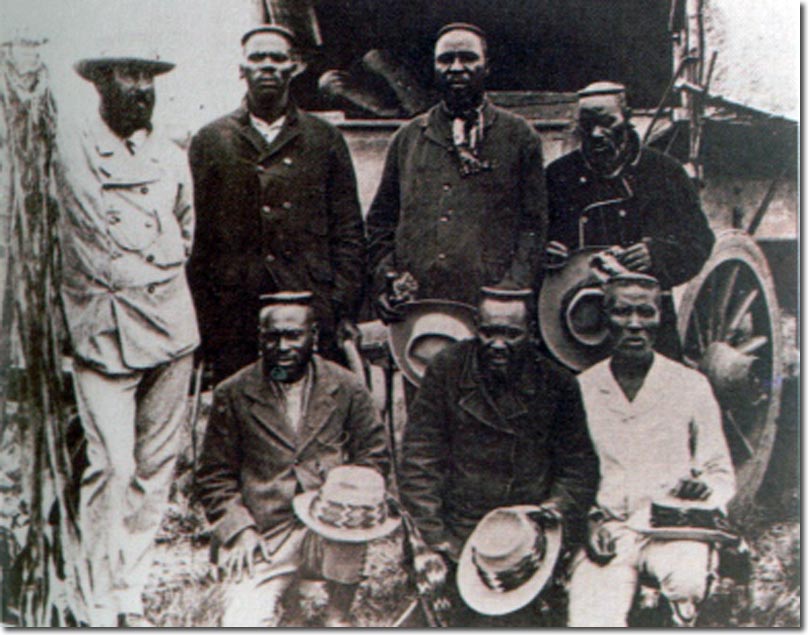|
|


|
|
John Robert Dunn was born in Port Natal in 1834 and became famous as the 'White Zulu'. He was fluent in the Zulu language and was employed by Cetshwayo as a go-between for negotiation between Zulus and the whites. Cetshwayo rewarded him with land and wives. Although he was married to Catherine Pierce he took 48 Zulu wives over a period of several years and fathered 117 children by them. When the Anglo-Zulu War started he had to side with the British.
An excerpt from 'Campaigning in South Africa and Egypt' by W C F Molyneux who whilst holding the rank of Captain served on the staff of Lord Chelmsford: 'John Dunn was the son of a Scotchman who had settled at Port Elizabeth in Cape Colony. Being of an adventurous frame of mind he had come to Natal about 1850, had been made interpreter to the Governor of Durban, and somehow got mixed up in the Zulu civil war of 1856, when Cetewayo defeated his brother Umbulazi on the Tugela. Though Dunn had been on that occasion with the losing side, he seems later on to have become most friendly with Cetewayo, and with his brother Dubulamanzi, whom he taught to ride and shoot with a rifle. The king gave him land near the Lower Tugela, and wives, and he was now a chief over a tribe. He had warned Cetewayo against fighting us; but when at the beginning of 1879 he saw war was imminent, he went over with his tribe into Natal and remained neutral. 'The General had asked him to come with us to Echowe as guide, for he knew every path and every bit of bush on the way. He would not promise, but when we had started he set off after us, and of course all the fighting men of his tribe followed their chief. We welcomed them warmly, gave each a red handkerchief for his head, and employed them as scouts. John Dunn was a handsome powerful man of about 40 years of age, a perfect rider and rifle-shot, rode an excellent jagd-paard (shooting horse) on all occasions, had the best of saddlery, breeches, boots and other clothes (which he always got from England, though he had never been there), and but for his large wideawake hat and tanned face might have been taken for an English country gentleman'. In the column led by Lord Chelmsford to relieve Echowe, before the battle of Gingindlovu, Dunn carried out a one man reconnaisance which established the location of the Zulu impi. This recce was carried out without clothes because it involved swimming across the Inyetzani River. But although he and his Zulu scouts were so useful to Chelmsford his association with the British brought him great sorrow. On the 6th April during the withdrawal from Eshowe, there was a false alarm early in the morning which spooked the soldiers and they fired on Dunn's scouts by mistake. There was a great deal of bloodshed and Dunn cried out, "They are killing my people! Are the men fools? Can't they hear them calling out? Oh, my children!" He may well have cried because many of them really were his children. Molyneux wrote of the withdrawal from Eshowe and what they saw the day after the terrible incident with Dunns' Scouts: 'We made an early start, and riding rather nearer the coast so as to pass Dunn's house between the Inyoni and the Tugela, reached Fort Pearson at noon. Dunn's house (or rather houses) was a sorry sight. Everything had been looted or pitched outside: some things had been burned; but what vexed him most was the destruction of all his journals. He took it very stoically, merely observing, "I have not done with the Zulus yet." I only saw John Dunn once again, at Durban; and though invited, I never had a chance of visiting him at his home. Rough things have often been said against one who has 'turned Zulu'; but the account I have given will show, I hope, that he was a genuine man, brave, generous, warm-hearted, and to us on this expedition certainly a host in himself.' John Dunn lived to the age of 61, dying on 5th Aug 1895. His numerous descendants settled in a 40 sq km reserve near the Tugela river. |
Zulu War | Zulu War Significant Individuals
Armed Forces | Art and Culture | Articles | Biographies | Colonies | Discussion | Glossary | Home | Library | Links | Map Room | Sources and Media | Science and Technology | Search | Student Zone | Timelines | TV & Film | Wargames
